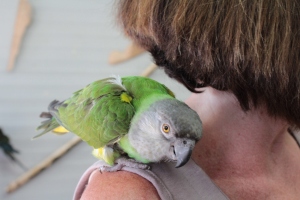Amazon have put all five seasons of Person of Interest on Prime. Person of Interest is an amazing exploration of what it might cost humanity to create artificial intelligence, and its beautifully prescient given Amazon’s recent Alexa data breach where a user was able to access another user’s recordings.
In my book (which if you’re looking for a last minute Christmas gift, do check it out) I talk about how we might end up studying personality through artificial intelligence, and the ethics of how we might consider this data use.
I’m delighted with my Christmas present of Person of Interest. I cry the whole way through this show. It is amazing. But I also have an Alexa sitting in my house, and a Google phone. Occasionally my phone flashes its screen, saying “I didn’t recognise your voice”, much like Athena’s ears prick when she’s snoozing and hears me get to my feet. Do I need to listen for you right now?
On the other hand, in 2018 I’ve also had to balance the issue of not having ethics committee permission to share sensitive data and the challenges that has caused for making my research open and reproducible. I am proud particularly of this repository which will be elaborated on in a publication next year – how we can be reproducible when we’re dealing with data that should be confidential. But yes, privacy is a challenge.
And it’s a very strange conversation to have in December. He sees you when you’re sleeping, he knows when you’re awake . . .
Recently, I was asked how old I was when I understood about Santa. It actually ties in to my first experience with religion. I was raised without any religion whatsoever, and when I got to school I was introduced to this whole new concept. That my own mind and actions were not my own private space, that someone or something might be watching. I made a deal with this ‘God’ (who I pictured as Danny Devito in a toga, I do not know why). If I was very good, he would reward me with a hotdog on Friday at lunch time. As one of the Mac kids, I was always at the middle of the lunch queue and the hot dogs were always gone. So I was very, very good for a whole week. I did the praying. I was kind. And on Friday . . . there was no hot dog.
The only other experience I had with religion was one of my grandfathers who had cryptically said “Any God who doesn’t want me isn’t a God I want to believe in”, and at the age of 5 I sanguinely accepted this logic, and decided the lack of hot dog meant God had no interest in my soul. That Christmas I tried this logic again, and created my perfect toy (a My Little Pony toy of my favourite character – except there would be movable bits). Santa did not come through.
We teach morality to children with the idea of oversight. Perhaps not entirely, but ‘being watched’ is a large component of how we learn our own moral frameworks. The Good Place has made an excellent TV show exploring the concept of being constantly observed (and measured). It’s probably not a coincidence that we’re interested in these stories right now. But it’s also not a coincidence that I got thinking about this after realising I knew more than I wanted to about my new neighbours.
Ultimately I think data collection and analysis is an organic process, and it’s very hard to draw a line over ‘good data collection and analysis’ and ‘bad data collection and analysis’. Amazon absolutely should not be sending clips of audio to a random stranger. But should I hear random snippets from my neighbours’ lives? How often should we accept being ‘overheard’ as a price of being digital neighbours?
I don’t have an answer for this – or even a reason to blog about it on Christmas eve. I just think it’s a very interesting question.
